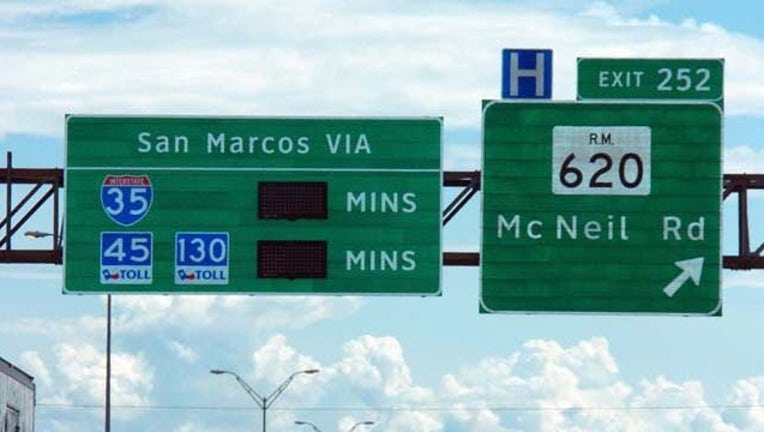New signs along I-35 display travel times comparisons between 130 toll road and I35

Image Credit: Texas Department of Transportation
New Signs Provide Comparison Travel Times for I-35, SH 130
AUSTIN – Making the decision whether to travel on Interstate 35 or State Highway 130 has just gotten a little easier. The Texas Department of Transportation has completed the installation of three travel-time signs at key diversion route locations along the I-35 corridor; the signs will begin displaying travel times on Tuesday, Oct. 27.
The new signs will provide comparison travel times for I-35 and SH 130. The signs were placed along northbound I-35 in Buda, southbound I-35 in Georgetown, and southbound I-35 in Round Rock to allow motorists to make an informed decision on routes.
“Drivers now have the ability to make a route decision based on real-time travel data,” said Greg Malatek, Austin District Engineer. “With I-35 in central Texas being one of the most congested highways in Texas, we have to keep looking for ways to manage traffic throughout this corridor. The incorporation of these travel-time signs where we’re using technology to move people and goods more efficiently is a step in the right direction.”
The goal of the signs is to share real-time data with users to promote better travel decisions, including routes, travel modes, and timing of trips, which increases reliability of the overall network. Bluetooth detectors located along the routes will transmit travel-time data to the signs using wireless technology. The signs will then display the approximate time it would take to travel from point A to point B on each roadway. This information is supported by TxDOT’s Lonestar software, which receives all the necessary data from roadway sensors on I-35 and SH 130.
“Today, a morning peak hour trip on I-35 takes 31 percent longer than the same trip during non-peak hours,” Malatek said. “If nothing is done, by 2035 the same trip will take more than 200 percent longer in the morning peak hour. Knowing there is no one single strategy to reduce traffic by itself, we’re taking an ‘everything including the kitchen sink’ approach to improve mobility and communication on I-35.”
The new travel-time comparison signs were funded through a $250,000 Federal Highway Administration grant. Installation work was performed through the Texas A&M Transportation Institute, in cooperation with Highway Intelligent Traffic Solutions, N-Line Traffic Maintenance and Skyline Technologies.

